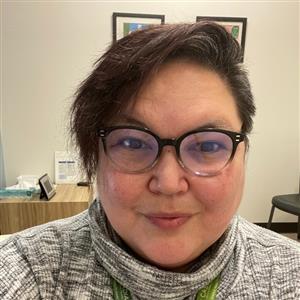June 7, 2022
Dispatches From Peer Providers: Peer Support is Strengths-Focused
By Lillian Moffitt, Peer Wellness Specialist at Garlington Health Center
As a Peer Wellness Specialist, a strengths-based approach to working with my peer participants is critical. Often, consumers of mental healthcare have experienced a loss of power and autonomy to their families, care providers, and the symptoms they have struggled with. This disempowerment can result in demoralization and a lowered sense of personal competency and capacity.
The reality is that anyone who has experienced the progression of mental health symptoms while engaged in mental health services has innate strengths enabling them to still be present and engaged. They continue to exercise those strengths and develop new ones through doing the work of recovery.
This was certainly the case with me. I was so overwhelmed with my symptoms that I felt powerless and weak because I couldn’t control what was happening in my mind and in my life. I had internalized societal stigmas and the belief that a person experiencing mental illness is weak.
Eight years ago, the first person to help me see that I wasn’t weak — but rather that I had the strength to recover — was a friend from my faith community who also happened to be a mental health clinician. She validated my experiences and my understanding of how I had gotten to be where I was. She offered to “walk with me” with the understanding that I had what I needed to recover and that I had strengths I wasn’t even aware of, which would enable me to get to a better place.
We automatically empower a person to see themselves as strong and capable when we start with three key beliefs: that the person in front of us has strengths which have helped them get this far, that they can grow those strengths, and that developing new ones is possible. As we continue to help them understand their strengths and identify how those strengths have aided them in their recovery process, they gain and improve their sense of competency in their lives and in the world.
This is what my friend did for me. She helped me to see the good things about myself and the things that could help both myself and others in the world going through similar things. She helped me walk the path to becoming a Peer Wellness Specialist, where I now encourage others to see and work from their strengths.
The National Association of Peer Supporters (NAPS) has put together National Practice Guidelines for Peer Specialists and Supervisors, which states this as one of the 12 Core Values of Peer Support:
Peer Support is Strengths-Focused.
“Each person has skills, gifts, and talents they can use to better their own life. Peer support focuses on what’s strong, not what’s wrong in another’s life. Peer supporters share their own experiences to encourage people to see the ‘silver lining’ or the positive things they have gained through adversity. Through peer support, people get in touch with their strengths (the things they have going for them). They rediscover childhood dreams and long-lost passions that can be used to fuel recovery.” (NAPS, National Practice Guidelines for Peer Specialists and Supervisors, p. 13, 2019)
We do this in the following ways:
- We encourage our peers to see their strengths and use them to make their lives better.
- We maintain and help our peers maintain focus on those strengths and how to use them.
- We use our lived experience to give examples of strengths and how we’ve used them in our lives as examples to encourage and offer hope to our peers.
- With a strengths-based perspective we can acknowledge that the peer we’re working with already has a foundation for recovery.
- With this understanding, we get to encourage and help our peers to identify what matters to them and to seek their dreams and goals.
- We aren’t here to fix our peers or solve their problems for them. We are here to empower them to do those things for themselves.
As Peer Supporters we help others to embrace their experience, strength, and hope.
Interested in a career that supports our community? Join our team!
You can learn more about becoming a Peer Wellness Specialist here.

